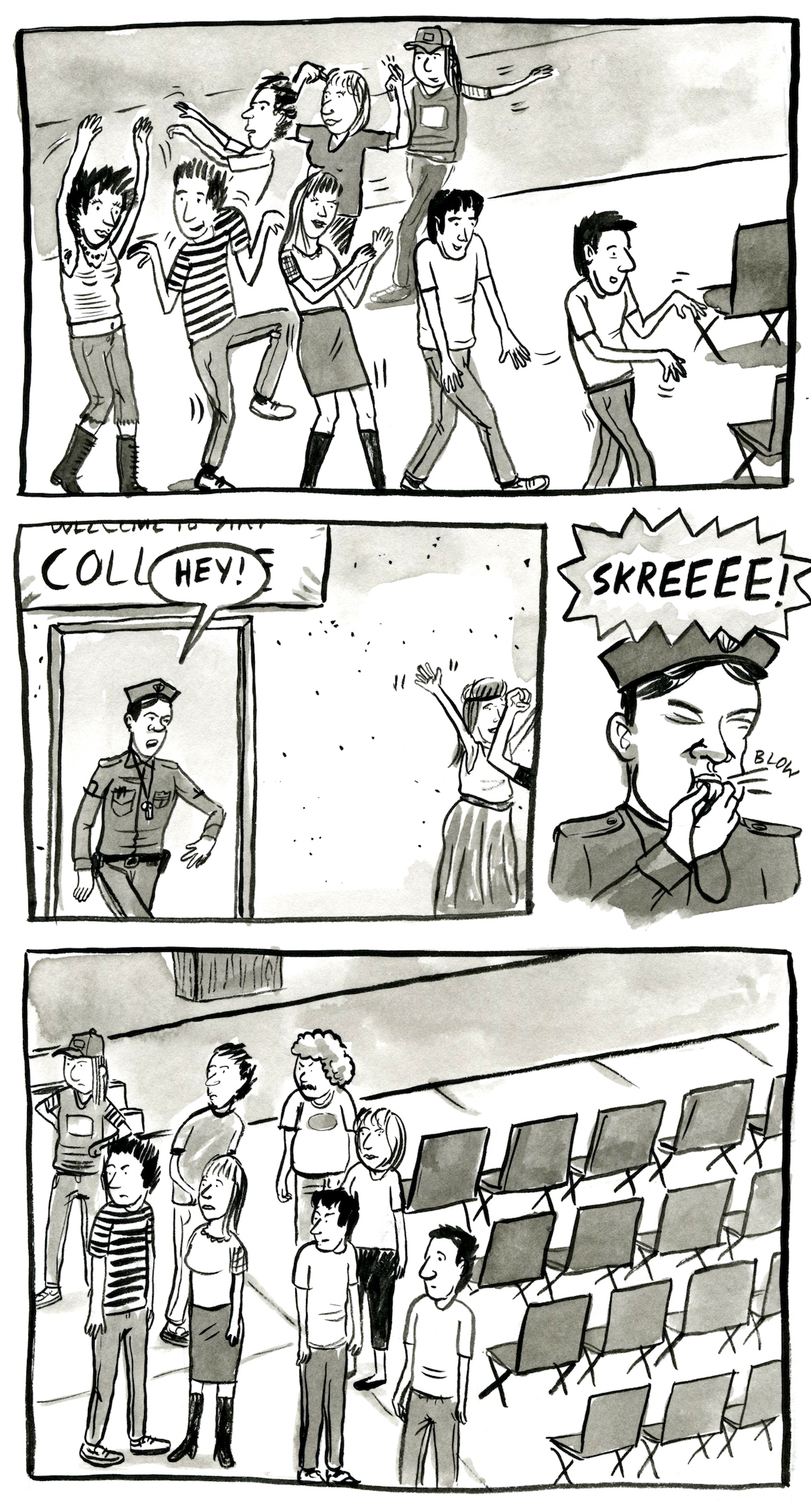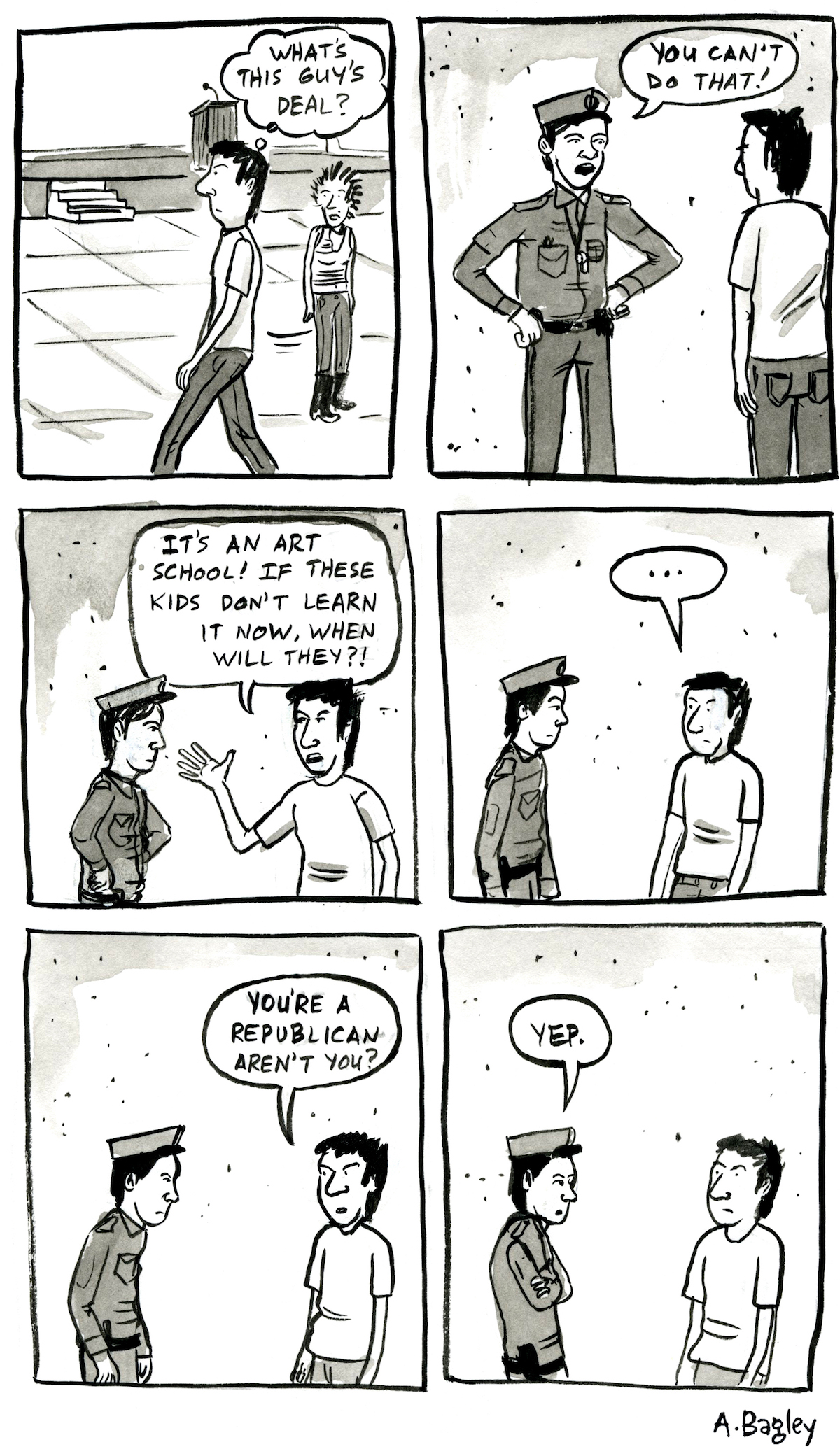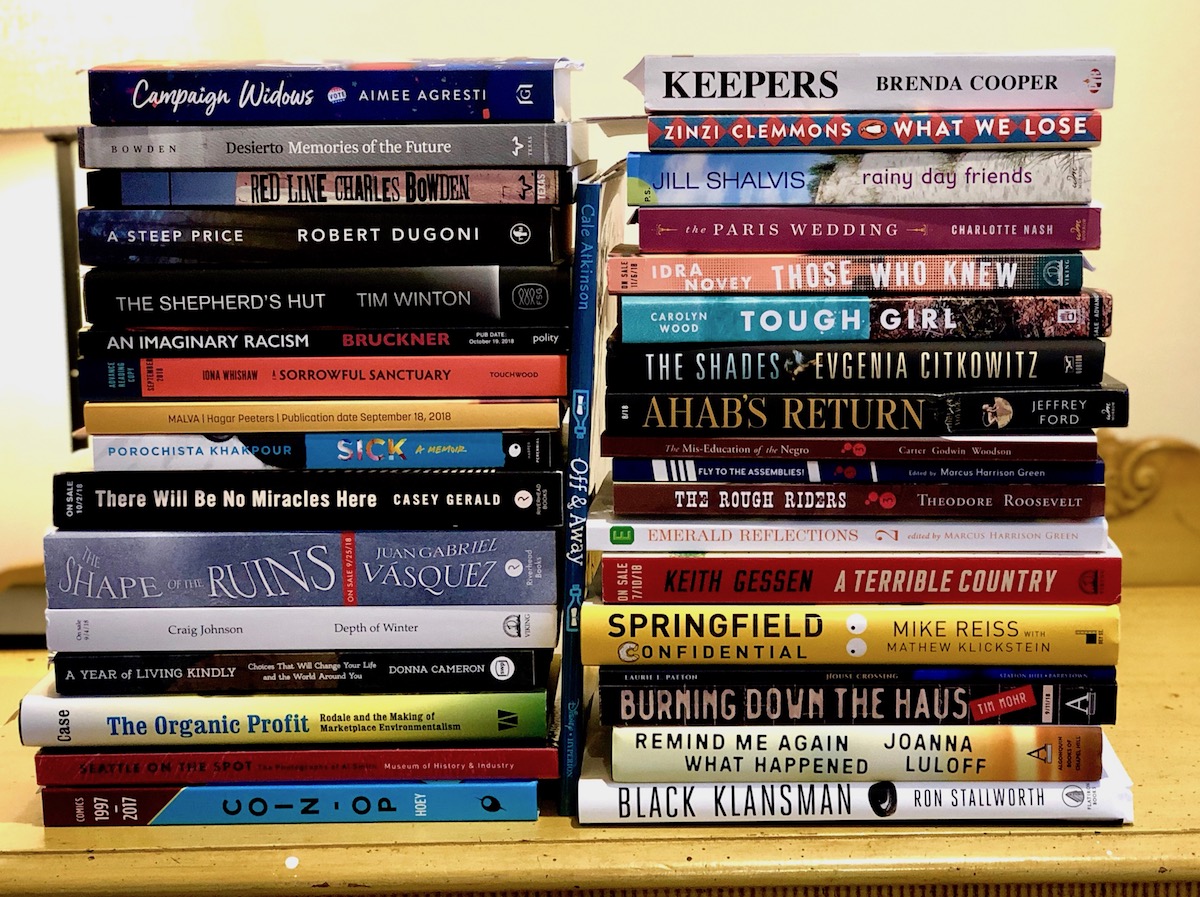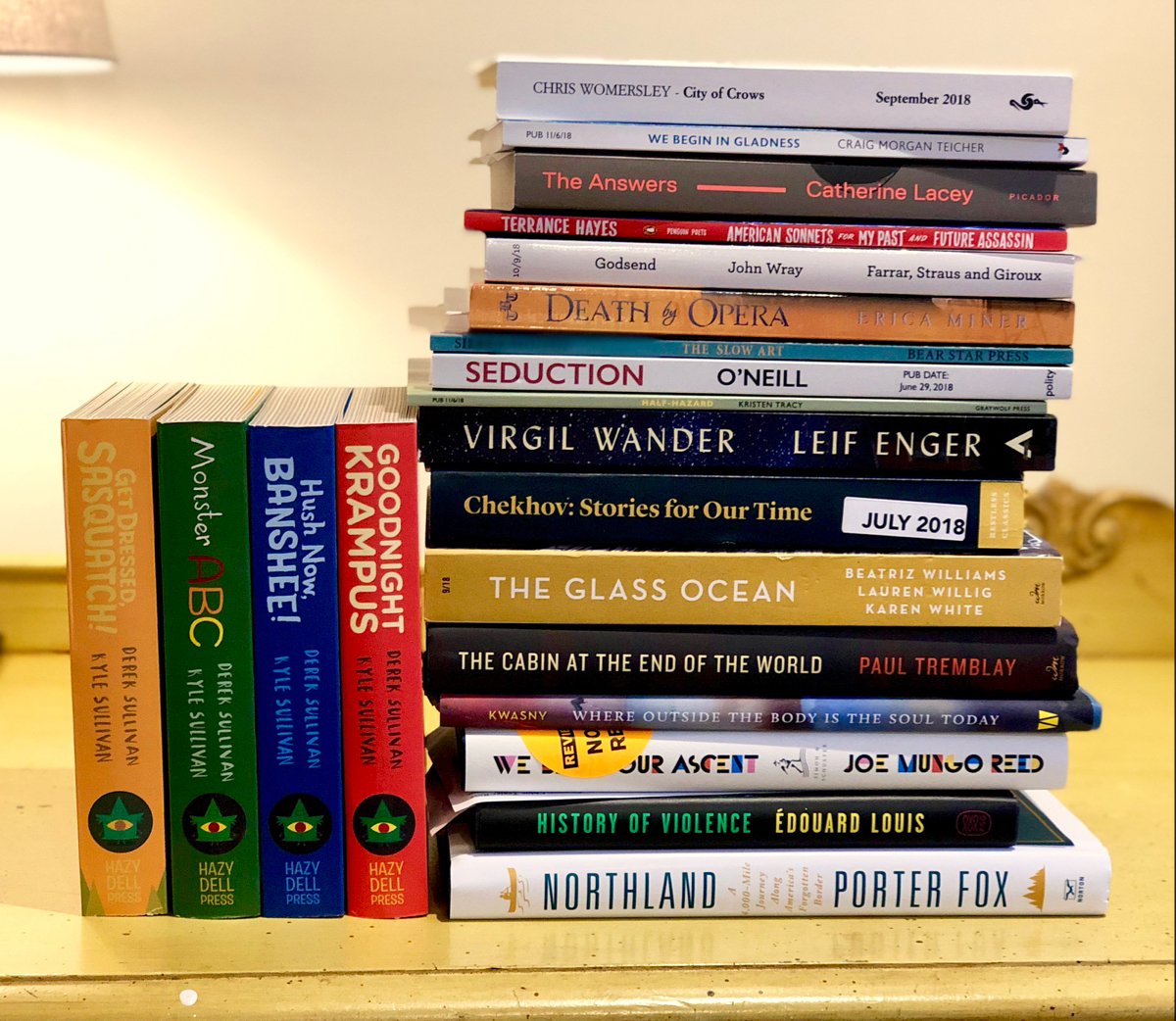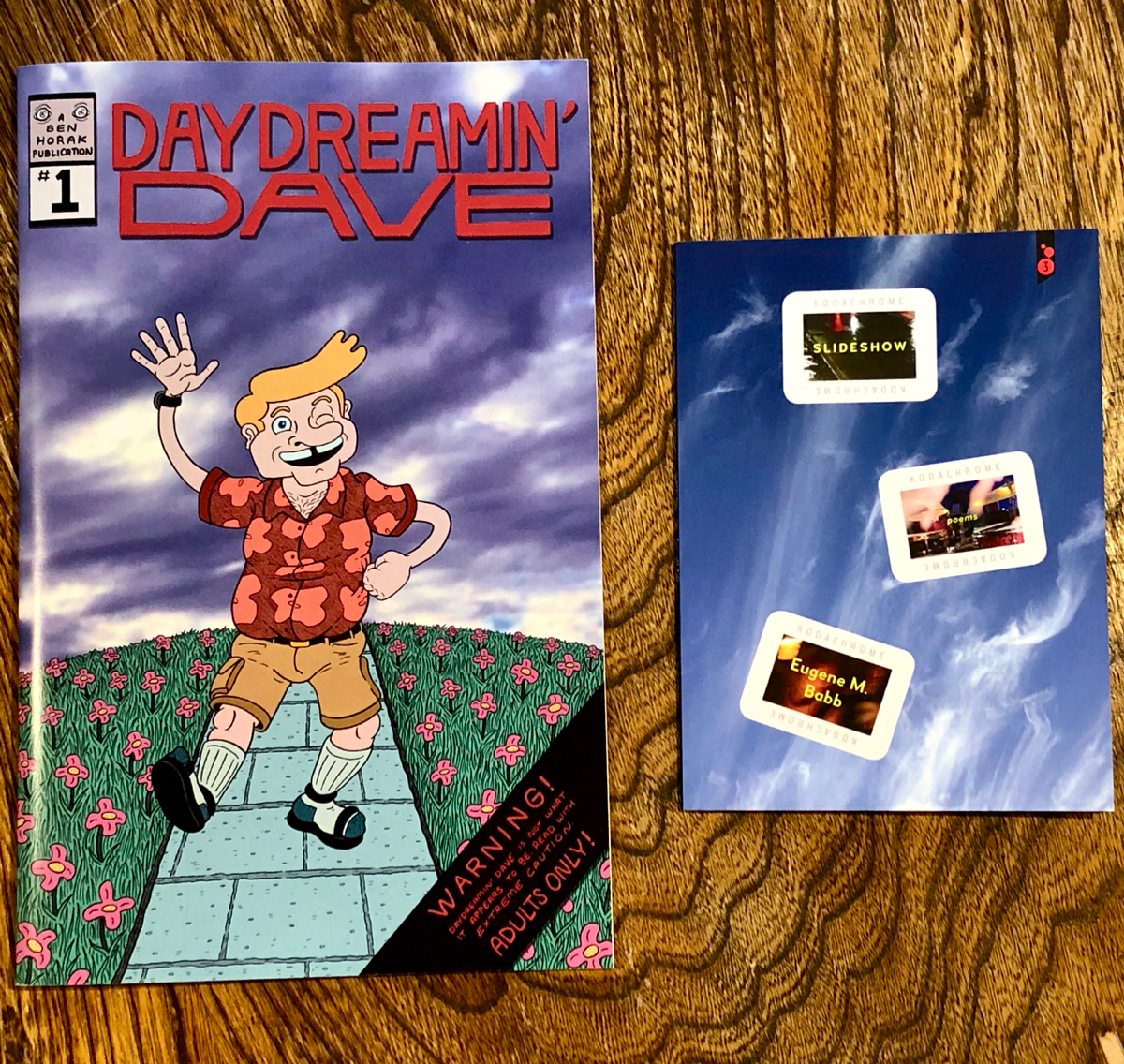The trouble with Springfield
A couple months ago, I did something I hadn't done in almost two decades: I watched an episode of The Simpsons. I wanted to see the show's response to Hari Kondabolu's documentary The Trouble with Apu, which addresses the racism in the show's handling of the Indian-American character Apu. Surely, The Simpsons would address the situation with some knowing self-deprecation, or a clever admission that our relationship with race and identity in the United States have changed considerably since the show first debuted in the late 1980s?
Unfortunately not. Instead, The Simpsons issued little more than a shrug, and the writers made the unfortunate decision to use Lisa Simpson — the one character on the show who could always be counted on to approach situations with nuance and empathy — as their mouthpiece. It was worse than lashing out at critics; it was a wince and a "whattayagonnado?"
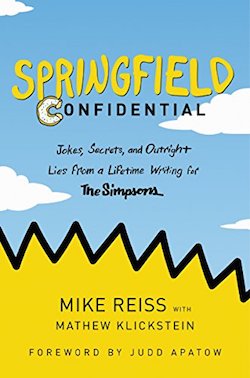
The other day, I sat down with a review copy of Simpsons writer Mike Reiss's memoir about his decades on and around the writing staff of The Simpsons, Springfield Confidential. The first chunk of the book, which was ghostwritten by celebrity journalist Mathew Klickstein, was breezy and funny. Reiss isn't interested in burning bridges with his old coworkers, so there's nothing too dramatic: a few pieces of trivia, mostly centering around Homer Simpson's development as a character, and some funny inside-the-writer's-room anecdotes. For its first half, it's aggressively okay.
But then Reiss addresses The Trouble with Apu, and the whole book goes sideways. Reiss refuses to accept The Simpsons's role in furthering the racist stereotype of Indian-Americans, and he refers to Kondabolu's film as "a nasty little documentary." He doesn't offer any supporting evidence for his claims that the film is "nasty," and then he settles the issue by, basically, saying that people are too darn sensitive these days.
I kept reading Springfield Confidential — you can read the book in a couple of hours without much effort at all — but Reiss, like The Simpsons, lost my sympathy in that moment. It became clear, then, that the problem with The Simpsons goes further than just a lack of consideration: it's institutional inertia, plain and simple. Reiss's by-the-numbers memoir, then, is a perfect portrait of how the show became so thoroughly unfunny and uninterested in the culture around it.
As near as I can tell from Reiss's account, people stopped caring about how to make The Simpsons as good as it could be. They simply became obsessed with the business of making The Simpsons. That's how the fatal flaws started to creep in, and that laziness and lack of introspection is apparent throughout Springfield Confidential.
愛上虛擬情人 (In Love with a Virtual Lover)
相思如雪花
抖落閃動的黑白
不在地上在心上
擾亂了高清的熒幕
你的面目糊了
哭笑拉成曲線
似有還無
我企圖伸手撫捉
電腦仍然溫熱
但鍵盤早已冷成一堆摩斯密碼
不肯吐露真情甚麼時候喜歡都可以
隨便會面或道別
祗要打開電源
鍵入角色的名字
你必定依約前來
比情人準時
說鎖定的對白
走預設的刀光劍影
凝視鏡頭的所在
掛一個因果不變的微笑
這樣煽情的劇目
你我都演得生死與共
從搜狐到土豆
我們各在天涯的網絡
所思在遠道不在眼前
眼前祗剩下一堆死灰
人去如燈滅
這些年來他總蒼白無語
曾經抱住的身影
最後祗給我一個漂流的網址
承諾、問候
祗寄存於病毒的電郵
打從一個人開始愛上自己之後
便註定不同心 也離居
於是我把他的名姓和密碼
一拼按下消除Translation
Yearning like snowflakes
shakes off the twinkling of black and white
not on the earth but in the heart
distorting the high-definition screen
your face is blurred
laughter and tears pulled and warped
like a return to nothingness
I try to catch it
the computer is tepid
and the keyboard has long since frozen into Morse code
unwilling to reveal the truthWhenever you like is fine
you can come and go as you please
just flip the power on
type in the role’s name
and you’ll arrive as you promised
more punctual than a lover
for a canned conversation
with the preinstalled glint of cold steel staring at the camera
putting on an unwavering smile
this rousing play
that we acted out holding nothing back from sohu.com to tudou.com
we’re both on the internet
and the one we love is far awayNot before our eyes
before our eyes is nothing but a pile of dead embers
people leave like a lamp clicking off
these past few years he’s been pale and silent
and the form I once embraced
only gave me a website in the end
promises and best wishes
are sent in infected email
after one begins to love oneself
hearts will separate and live apart
and so with one stroke
I delete his name and password
Hear Peter Curtis at University Book Store on June 27
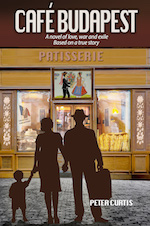
Based loosely on Curtis's own experiences during World War II, and on almost two decades of research, the trilogy tracks Willy and Sophie Kohut and their three-year-old son Pavel as they struggle for survival in an embattled Europe. Just released in April, Café Budapest pickes up where The Dragontale Buttonhole left off, with the family's arrival in Paris, penniless, wounded, and afraid. Peter Curtis is reading from Café Budapest on June 27 at University Book Store; check out info and an excerpt on our sponsor feature page, then put the event on your calendar.
Sponsors like Peter Curtis not only bring great events and new releases to your attention, they make the Seattle Review of Books possible. Did you know you could sponsor us, as well? If you have a book, event, or opportunity you’d like to get in front of our readers, find out more, or check available dates and reserve a spot.
Your Week in Readings: The best literary events from June 11th - June 17th

Monday, June 11: *Circe Reading
Madeline Miller's Circe was one of the big literary surprises of the spring: a novel that reaches back into mythology and gives voice to a goddess who is often shunted off to the side. Miller will appear in conversation with Nancy Pearl. University Book Store, 4326 University Way N.E., 634-3400, http://www2.bookstore.washington.edu/, 7 pm, free.Tuesday, June 12: Rock Steady Reading
Ellen Forney is the one thing on which both old Seattle and new Seattle can agree. Ellen Forney's illustrations are like beams of pure happiness fired straight into your cerebral cortex. Ellen Forney's latest book, Rock Steady, is a mental health guide for people who are suffering from mental disorders. It is a book that will save lives. Thank you, Ellen Forney. Ada’s Technical Books, 425 15th Ave, 322-1058, http://seattletechnicalbooks.com, 7 pm, free.Wednesday, June 13: Like a Mother Reading, Moss Volume 3 Release Party
See our Event(s) of the Week Column for more details. The Summit, 420 E. Pike St., 652-4255, http://townhallseattle.org, 7:30 pm, $5, 21+. and Type Set, 3827C, S Edmunds St, https://www.typesetseattle.com/, 7 p.m., free.Thursday, June 14: The Emperor of Shoes Reading
An American in China takes over his father's shoe factory in author Spencer Wise's new novel. With the help of a Chinese seamstress, the protagonist eventually comes to realize that the factory is an exploitative pit of despair, and unimaginably corrupt besides. Third Place Books Ravenna, 6504 20th Ave NE, 525-2347 http://thirdplacebooks.com, 7 pm, free.Friday, June 15: Whirlaway Reading
Poe Ballantine has been writing for a very long time now — it's been nearly 15 years since his novel God Clobbers Us All was published. And Ballantine has attracted a ferocious fanbase, full of people who love writing by the Beats but hate the shitty masculine tropes that come with the Beats. His latest novel, Whirlaway, is published by excellent Portland press Hawthorne Books, and it's about an escapee from a California asylum. Elliott Bay Book Company, 1521 10th Ave, 624-6600, http://elliottbaybook.com, 7 pm, free.Saturday, June 16: Bloomsday Staged Reading
It's Bloomsday again, so get your Joyce on with this reading from Ulysses. If you're someone who tried and failed to enjoy Ulysses in print, hearing it read aloud might just be the key that unlocks the book for you. Seattle Public Library, 1000 4th Ave., 386-4636, http://spl.org, 2:30 pm, free.Sunday, June 17: The Grow House Reading
Seattle author Nick DiMartino debuts his latest thriller, about a marijuana grow house in Maple Leaf which becomes the subject of unwelcome attention and a bookseller who wanders into harm's way. University Book Store, 4326 University Way N.E., 634-3400, http://www2.bookstore.washington.edu/, 3 pm, free.Literary Event of the Week: Conflicts of interest abound
I try to provide alternate options in the readings calendar when there's a reading that features a conflict of interest. But this Wednesday, even my alternative to the conflict of interest is a conflict of interest. But I promise you that one of these two events will almost certainly be your favorite event of the week.
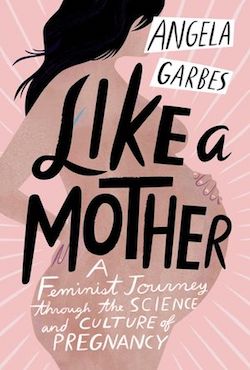
Let's talk about the first conflict of interest: Angela Garbes, who was my coworker at the Elliott Bay Book Company many years ago and was my coworker at The Stranger not so many years ago, launches her new book in a reading at the Summit. Garbes is reading from her book Like a Mother, which is about "A Feminist Journey Through the Science and Culture of Pregnancy." The book has received a ton of positive pre-publication attention, including a very fancy visit to Fresh Air, so you'll probably want to go to this.
And in case it wasn't conflict-of-interest-y enough for you, Garbes is joined in conversation onstage by her old friend (and also my old coworker) Lindy West. Expect a very smart conversation about why some of the most obvious facts about pregnancy and motherhood have been ignored by medical professionals since, basically, forever.
But then across town, there's an event that's even more conflict-of-interest-y than the Like a Mother event. How can that be? Well, I'm part of it.
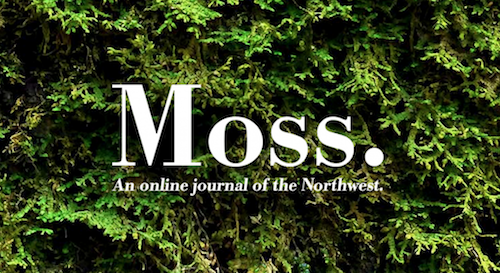
To celebrate the release of its third print edition, Northwest literary magazine Moss is hosting a big party. It takes place in Columbia City at Type Set, the writer-centric coworking space. Food and drink are included in the entry price (which is, uh, free) and you'll hear a ton of new work from Northwest authors.
Richard Chiem, Kristen Milares Young, and Tara Roberts will read fiction and/or prose, and then Jasleena Grewal, Troy Osaki, and Rich Smith will read poetry. I'll be interviewing the poets onstage, in part to help celebrate Moss's foray into the world of poetry, which kicks off with this collected volume. (The magazine originally only featured fiction and non-fiction; they only started running poetry last year.)
Look, I can't tell you what to do on Wednesday night. They both look like great readings. But you probably already know what you want to do — and you should definitely listen to your inner voice. Sometimes the best conflict of interest is the one that's been inside you all along.
The Summit, 420 E. Pike St., 652-4255, http://townhallseattle.org, 7:30 pm, $5, 21+. and Type Set, 3827C, S Edmunds St, https://www.typesetseattle.com/, 7 p.m., free
The Sunday Post for June 10, 2018
Each week, the Sunday Post highlights a few articles we enjoyed this week, good for consumption over a cup of coffee (or tea, if that's your pleasure). Settle in for a while; we saved you a seat. You can also look through the archives.
On immigration
Paul Dean on moving across borders, power’s bureacratic sword and shield (remember Papers, Please?), and the diminished dream of freedom in countries built on that ideal. This is a different kind of immigration story, about the authoritarianism trying to hide behind a smokescreen of fear-mongering headlines. Quiet-voiced, gently meandering, will have you by the throat if you follow it through.
Opening the gates is brave. If you open the gates, people come in, and many of those people are different. That’s a scary concept. They might do and want and need different things. If you close the gates, shore them up, raise the drawbridge and fill the moat with hydrochloric acid, you’re much, much safer.
Everything inside is wholesome and good.
Somewhere Under My Left Ribs
Christie Watson on a nurse’s experience of the operating room — not a tell-all, but a meditation on compassion, the connection between body and spirit, and how humans on both sides of the knife manage the terror and pressure of courting death to save a life.
I have looked after such patients, who are told post-operatively that things were a little unstable in theater, but the surgeon managed to stabilize them. The language of nursing is sometimes difficult. A heart cell beats in a Petri dish. A single cell. And another person’s heart cell in a Petri dish beats in a different time. Yet if the two touch, they beat in unison. A doctor can explain this with science. But a nurse knows that the language of science is not enough. The nurse in theater translates “your husband / wife / child died three times in there, but today was a good day and, with a large amount of electricity and some chest compressions that probably broke a few ribs, we managed to get them back” into something that we can hear. A strange sort of poetry.
Anthony Bourdain and the Power of Telling the Truth
Helen Rosner writes about Anthony Bourdain with respect and affection and regret. She celebrates Bourdain not just for his accomplishments, but for his resilience, humility, and willingness to evolve while holding a staredown with the greedy public eye.
Bourdain effectively created the “bad-boy chef” persona, but over time he began to see its ill effects on the restaurant industry. With “Medium Raw,” his 2010 follow-up to “Kitchen Confidential,” he tried to retell his story from a place of greater wisdom: the drugs, the sex, the cocky asshole posturing — they were not a blueprint but a cautionary tale. Ever resistant to take on the label of chef, he published a book of home recipes, in 2016, inspired by the cooking he did for his daughter. Despite its chaotic cover illustration, by Ralph Steadman — and its prurient title, “Appetites” — the book, which was co-written with his longtime collaborator, the writer Laurie Woolever, is a tender memoir of fatherhood, an ode to food as a vehicle for care.
See also PNW writer Tabitha Blankenbiller’s essay on Kate Spade in Salon — you may never carry one of Spade’s iconic handbags, or want to, but this will help you understand why they matter so much those who do.
Climate Change Can Be Stopped by Turning Air Into Gasoline
This is delightfully MacGyver-y: a scientist at Harvard University has hacked together a series of processes used by paper mills to pull excess carbon dioxide from the air and turn it back into previously-known-as fossil fuels. One of my favorite things about this piece is the deadpan quotes from other scientists saying it could work, which seem to be the academic equivalent of throwing your hat in the air with joy.
Speaking from Cambridge, Massachusetts, on Wednesday, Keith said he was “pretty optimistic” about climate change. “The reason is that the market for these low-carbon fuels is much, much better than they were a few years ago. At the same time, low-carbon power — electricity generated by solar and wind — has just gotten much cheaper.”
Outside experts said they were encouraged by Keith and his colleagues’ approach, but cautioned that it would take time to examine every cost estimate and engineering advance in the paper. The consensus response was something like: Hmm! I hope this works!
On The Radio, It’s Always Midnight
Seb Emina on the pleasures of listening to late-night radio any time of day. Somewhere in the world, it’s always midnight — late-night callers, late-night music, a world full of late-night dreams.
Without exception, these late-night conversations meander off into meditations on how things are not how they used to be. This is a function of two truths, namely that (1) in the middle of the night, the caller gets to speak indefinitely because who knows when the next caller will show up, and (2) once midnight has passed, almost anyone who speaks off the top of their head for more than three minutes, on any subject, will stray into nostalgic reverie. In Westchester, New York, for example, a man has called SportsRadio 1230AM at three in the morning to express sadness about the decline of fistfights in stock-car racing.
Whatcha Reading, Jessixa Bagley
Every week we ask an interesting figure what they're digging into. Have ideas who we should reach out to? Let it fly: info@seattlereviewofbooks.com. Want to read more? Check out the archives.
Jessixa Bagley is an award-winning, Seattle based illustrator and children's book author. Her books include Boats for Papa, Before I Leave, Laundry Day, and most recently, Vincent Comes Home, which was a collaboration with her husband, Aaron (whose work you may recognize).
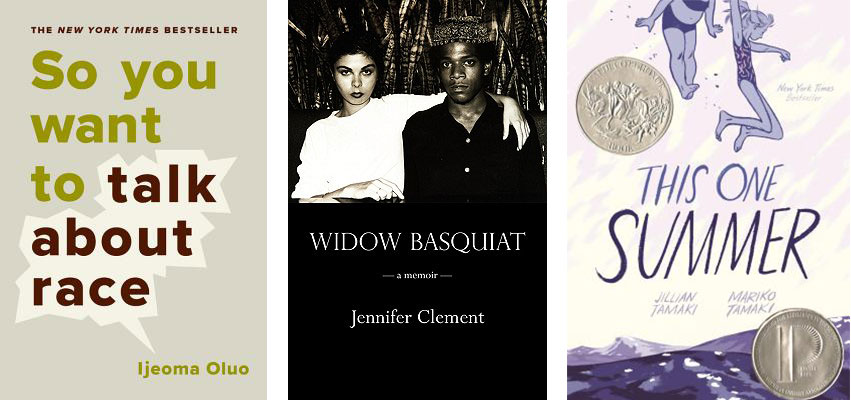
What are you reading now?
I am currently reading a book I feel simultaneously everybody is reading and also not enough people are reading, Ijeoma Oluo’s So You Want to Talk About Race. It’s about having effective conversations about race. This book really says it all. I don’t use Twitter much, but as I’m reading this book, I feel like I should be live tweeting every line I read. If you are a person of color, I guarantee you’ve have more awkward conversations about race than you care to recall. And if you are a person of "non-color," then I guarantee you have questions or thoughts about race you just aren’t sure how to express or maybe you need some help in the most appropriate way to express them. And yes, as Ijeoma states very upfront in the beginning that if you are white, parts of this book will probably make you feel uncomfortable. We'll I’ve been personally uncomfortable with regards to my race my whole life, including situations with family and close friends, so I think feeling uncomfortable while reading a book is nothing by comparison. I think this book is just what we need right now. If we don't start talking productively and respectfully about race we won't ever really get anywhere. And our kids won't get anywhere. We need to get better at these conversations so eventually they can stop happening all together and we can just talk about Netflix guilt-free.
What did you read last?
I just recently finished reading, Widow Basquiat by Jennifer Clement. I ADORED this book. It was like taking a time machine (probably a Delorean) back to the New York City art scene in the early 80's. The book is about about the famous graffiti artist/expressionist painter Jean-Michel Basquiat and his relationship with his "girlfriend" Suzanne Mallouk. The book is from Suzanne's perspective and written by a mutual friend. It painted such a vivid picture of the experience of what it was like to know Basquiat and understand the ideas and process for paintings. While reading, you really feel like you are there seeing the intense electricity (and sometimes bizarreness) of the highs and the lows of their love and lifestyle. Stylistically, it is one of the most beautifully written books I've ever come across. Each chapter reads like a gorgeous poem (also in length) and ends with detailed background information about what was happening at that point in their relationship explained by Suzanne. The best part is that throughout the book they'll talk about some incident that happened (like the time Suzanne attacked Madonna in a club in a jealous rage) and Basquiat painted a painting about the incident. On my own I would look up the paintings as a read so I could get a richer understanding of Basquiat's work. This book invites you into the most elite, intimate, cool kids party ever. You feel like you know Jean and Suzanne after reading. It's real and beautiful and ultimately very sad. Even if you don't know much about Basquait or his artwork, I think anyone who appreciates exquisite writing and art at all would love this book.
What are you reading next?
I make the "mistake" of enjoying re-reading books. I can't help it. I know my book reading time is limited, but I really like it. I'm part of the re-run generation. Every book makes you feel different things and some books I want to experience the feelings of all over again. So my next read is a re-read of This One Summer by Mariko Tamaki, illustrated by Jillian Tamaki. I have to be honest, I don't remember much about this graphic novel. (Parent brain tends to erase 90% of the details in my memories lately.) But I remember LOVING this book. The art, the adolescent coming of age story, the teen feels... I remember it's very beautiful and really captures the awkwardness of being an almost-teen and how you fit (or don't fit) in the world. I think it will be a perfect transitional book into summer and probably leave me feeling very insecure, melancholy, and heartbroken.
The Help Desk: The man I'm crushing on has a big-book problem
Every Friday, Cienna Madrid offers solutions to life’s most vexing literary problems. Do you need a book recommendation to send your worst cousin on her birthday? Is it okay to read erotica on public transit? Cienna can help. Send your questions to advice@seattlereviewofbooks.com.
Cienna Madrid is off today; the following is a reprinted Help Desk column from 2015.
Dear Cienna,
There's this guy who rides the elevator with me at work pretty often. He always has a big, complex book in his hands — Bolaño, or DFW, or Knausgaard. He's pretty good looking, but I've held off smiling at him because I'm worried his choice of books means he's going to be pretty intellectually limited. Is there a safe way to test him in public before asking him out on a date?
Pat in the Columbia Tower
Dear Pat,
Here’s what I suggest: Start carrying around a copy of your favorite book in your bag. The next time you’re stuck in an elevator with this handsome stranger, break the ice by saying something like, “I notice you read a lot of very serious books written by unsmiling men, so I thought you might enjoy this change of pace. It’s my favorite.” The beauty is, it doesn’t really matter what your book is – it could be something truly great, like Octavia Butler’s Bloodchild, it could be last week’s TV Guide, or it could something he might actually enjoy, like the latest bullshit pumped out by Jonathan Franzen (if you go the TV Guide route, it helps to tape an unused condom to the inside cover). The point is, you’re being both flattering and assertive. If he’s smart and interested, he’ll read your book or at least continue the conversation. If he’s an intellectually stunted dummy, say “fuck it” and ask to see his abs. They can’t be any less interesting to talk to (and if by some miracle they are, you can always start taking the stairs).
Kisses,
Cienna
Portrait Gallery: Royal Alley-Barnes
Each week, Christine Marie Larsen creates a new portrait of an author or event for us. Have any favorites you’d love to see immortalized? Let us know
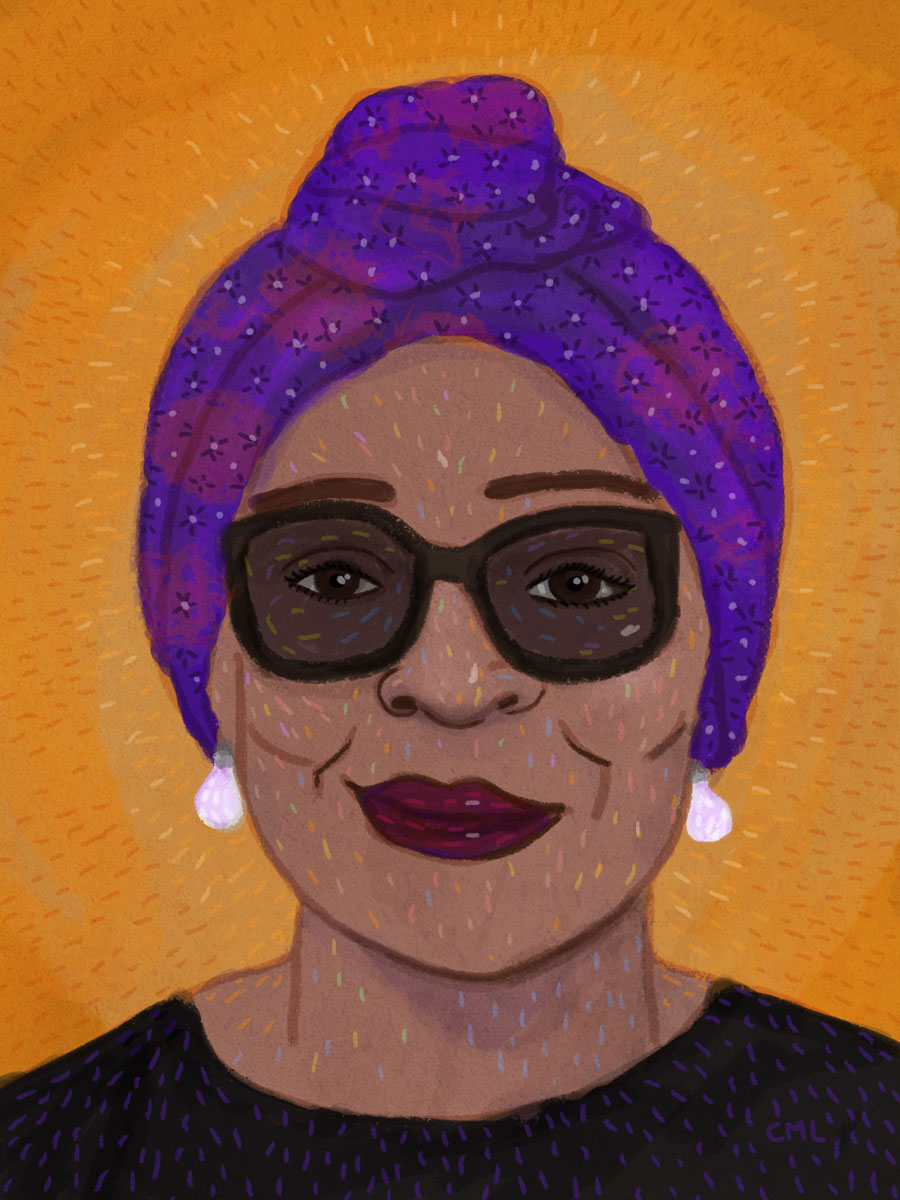
Saturday, June 9: All Power: Visual Legacies of the Black Panther Party Panel Discussion
To celebrate the half-centennial of Seattle’s Black Panther Party, the Frye is hosting a “panel discussion examining the local impact of the aesthetic legacies of the Black Panther Party with artist, activist, and cultural policy expert Royal Alley-Barnes and King County Councilman Larry Gosset.” These Black Panther Party Events have been a lot of fun, and it’s truly moving to watch as people who were involved with the Party back at the beginning reunite after many decades apart. Frye Art Museum, 704 Terry Ave, 622-9250, http://www.fryemuseum.org/, 2 pm, free.
Kissing Books: Ef-slash-ef = Pride
Every month, Olivia Waite pulls back the covers, revealing the very best in new, and classic, romance. We're extending a hand to you. Won't you take it? And if you're still not sated, there's always the archives.
It is embarrassingly easy to not realize you’re bisexual until age thirty-five.
You start by growing nervous as a tween because you haven’t had a crush on anyone, and all or most of your friends have. In my middle school Having A Crush was an accepted route to Being Interesting And Grown-Up, at least for the length of a slumber party, so it was stressful to be the only one not gushing over Tiger Beat heartthrobs with bowlcuts and multiple layers of shirt. Was there something wrong with me? Was I one of those lesbians people were just beginning to talk about where kids like me could hear? (This was a few years before Ellen.) How did I know who I was until I knew who I loved? When I finally did develop feelings for a boy — hyperbolic, helpless, dreamy feelings that were plenty easy to identify — I stamped the label straight on myself with some relief and considered the matter closed.
For twenty years. While I dated men and fell in love with men and married a man. That’s what you do when you’re a straight woman, right? Our wedding was on Pride Weekend, in the heart of Seattle’s queerest neighborhood, with six bridesmaids in different dresses wearing literally all the colors of the rainbow. Looking back, I’m a little embarrassed at how heavy-handed that foreshadowing turned out to be.
The insistence on being born this way or I always knew that inflects a lot of gay rights discourse has not been entirely helpful when it comes to the erasure of bisexuality. The questions whispered by that small voice in the back of my head could be so easily ignored. Sure, I tried to be an ally, and voted accordingly on every anti-discrimination and civil rights issue I could. Sure, I was occasionally poleaxed by how beautiful women could be. Sure, I’d occasionally think about kissing one — but that was just because our culture uses images of women when it wants to communicate about sex, right? So you learn to think of women as sexy because it’s a constant, neverending message, yeah? It’s not like it means anything. And I definitely liked men — some of them quite a lot! — so clearly I was really and truly straight. Or maybe I was doing it for the attention: secretly, silently swooning over the occasional woman without doing anything or telling anyone…for the attention. Sure, that makes sense.
And then, at age thirty-three, I decided it was time to diversify my reading and picked up my first f/f romance. Cathy Pegau’s Rulebreaker is a sci-fi heist story with a bisexual con artist heroine named Liv, who knows better than to fall in love with her mark, but does it anyway. I’m not at all surprised I loved it: it’s just my kind of catnip.
What did surprise me: it felt like coming home. Liv knows she’s bi but has never dated a woman, and her uncertainty about this new side of herself felt like a mirror I was looking into. The book is unusual in that it puts both m/f and f/f sex on the page — something a vocal subset of readers of queer romance object to, but which was helpful for me because it showed that Liv didn’t have to disavow her attraction to men to explore her attraction to women. It wasn’t that her history with men had been false, and this new side was The One Real Truth; it was about finding an additional piece of the puzzle. Gaining something, not losing something.
I’m not here to say that reading f/f romance made me queer — but it sure didn’t hurt.
I read every one I could find for the next three months. Sci-fi, fantasy, contemporary — good ones, really good ones, and ones that were only so-so. I started asking myself some rather pointed questions about tamped-down moments and experiences in my past. And then a couple years later Mr. Waite and I were watching Brooklyn 99 with gorgeous badass detective Rosa Diaz and the scales tipped. I recall being in the kitchen getting popcorn when Mr. Waite called out, “Hey Olivia, Rosa’s wearing a shoulder harness in this one.”
“Oh my gosh, really?” I sprinted in, trailing popcorn, the mini-dachshund bounding after to devour the fallen. And then I stopped, and turned to Mr. Waite with a furrowed brow. “These aren’t really platonic feelings to be having, are they?”
“No,” he said, laughing sweetly. “They’re not.”
Since then Stephanie Beatriz, the actress who plays Rosa Diaz, came out as bisexual. Then Rosa was revealed as bi in a milestone episode and got a girlfriend. This still feels eerie and magical, like when someone offers you a gift you may have wished for but never told anyone about. Several authors whose work I’d long loved came out as queer, as trans, as asexual. A lot of lighter TV shows practically exploded with bisexual characters. I learned I wasn’t the only one who took three or more decades to parse things out. It’s a dazzling feeling, after having been keeping a secret for so long, even from yourself, to be suddenly surrounded by mirrors.
It’s not all glitter and sparkles, of course — mirrors can have sharp edges, and spotlights aren’t always safe. We know who’s in the White House. I came out officially the day after the election because I wanted people to know where I stood, and with whom. It was an impulsive decision, but it was the right one, even though I’m still very much in processing mode. I may be for thirty more years, who knows? Every time I talk about it — even in passing, or in low-key pieces like this one — it feels like sliding one foot oh so carefully out past the edge of the cliff.
It may make me a bit breathless, but it’s a hell of a view.
Recent Romances:
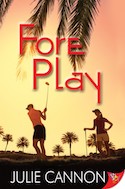
Fore Play by Julie Cannon (Bold Strokes Books: contemporary f/f):
Romance author Gerri Russell once stated: “If your hero’s a firefighter, your heroine better be an arsonist.” (Any author with an arsonist heroine should pitch me immediately.) And it’s certainly one way to build a romance: one character’s wealthy and the other’s broke, one character’s grumpy and cynical and the other’s a sunny beacon of pure golden optimism. But simple difference is not the same thing as a meaningful contrast: there needs to be some connective material in the middle, or else it’s just a mismatch. You might as well try to drink whiskey from a pint glass (not recommended).
This book tried to do something really interesting: treat an ex-con heroine’s experience seriously without softening the facts of it even a little bit. Peyton’s part of this book is a gritty, blue-collar tale about people who’ve been hard done by and who have to make imperfect choices to protect the ones they care about. This could have made for a really unique, brave romance. She killed a man who needed killing, served hard time, and now works as a golf pro/caddy/beverage server at the club her brother runs. Unfortunately, she’s paired with a heroine who seems to have been pulled from another book entirely — Leigh is a female CEO right out of the escapist, glamorous realm of Harlequin Presents. She drives an imported car, wears designer clothing, and does adrenaline-fueled sports on the weekend (motorcross) to work off the stress of the corporate world. Leigh is determined to become a better golfer to impress her wealthy colleagues and boss. Peyton is DIY-installing secret video cameras in her apartment to film the abusive midnight visits of her parole officer, who likes to trash her apartment and cop a predatory feel.
These two have absolutely nothing in common except that they really want to fuck each other. And they don’t even do that until nearly seventy percent of the way through the book! And then it’s just sex — no bonding, no sharing, no establishing of any kind of partnership outside nudity and bedsheets. It feels like the author is trying to corral them into a relationship, and the characters are digging in their heels. The only reason I finished the book was to see how long our heroines could hold out against authorial pressure. Some romance novels, like some relationships, are just not meant to be.
Leigh’s heart was pounding, and surely Peyton could feel it. Peyton stiffened, then relaxed against her, then quickly stepped away.
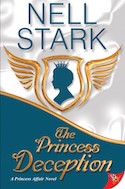
The Princess Deception by Nell Stark (Bold Strokes Books: contemporary f/f):
Nell Stark’s Princess Affair series of lesbian royalty romances is pure luxury escapist pleasure reading, straight up, no chaser. This latest volume is a contemporary retelling of Twelfth Night that involves a World Cup bid, a pro soccer player-turned-journalist, and a Belgian princess impersonating her twin brother while he recovers from an overdose. It’s as high-concept as it comes, but grounded in some beautifully potent feelings. Duke’s loss of her professional soccer career due to an injury is still raw and poignant, and it puts her in the right place to appreciate Viola’s grief and anger about her brother’s newly revealed addiction. This is the kind of connective tissue that was missing from Fore Play — the sense of a shared struggle, or at least shared understanding of parallel struggles. Both heroines are reeling, in that dizzy headspace where bad ideas seem like great ideas. Impersonating your twin brother is the only way to win the World Cup bid! Flirting with that princess you’ve discovered in disguise is a great way to boost your journalism career! Things go predictably to hell in all the best ways and it’s great, smart, angsty fun for the reader. Themes of exposure, revelation, coming out, and disguise intertwine to keep things feeling complex without overwhelming. The slender mystery subplot and beautifully rendered, rare locations (Amsterdam! Prague!) are the frosting on the cupcake. A+ travel reading to lose yourself in on a long flight or a lazy beach.
”Some memories have a shelf life,” she finally said. “An expiration date, beyond which they aren’t useful.”
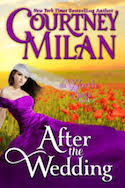
After the Wedding by Courtney Milan (self-published: historical m/f):
Speaking of cross-class romance and characters in disguise … Courtney Milan’s latest Worth Saga book is a glorious, achy, writhe-on-the-couch-making-wordless-squeaks-of-mingled-agony-and-delight heartbreaker of a romance between an earl’s daughter-turned-serving maid and a half-black porcelainware designer whose uncle is a politically ambitious bishop. We start on page one with a shotgun wedding and things get increasingly fraught from there — it has all the intrigue you miss from the old crazysauce days of greats like Bertrice Small and Laura Kinsale, plus a pragmatic view toward queer lives in the 19th century (Camilla is bisexual, and one particularly memorable secondary character is delightfully frank about her lesbianism). The series’ first book Once Upon a Marquess had a heroine with an atrocious temper, and this one has Camilla, the loneliest, thirstiest, most love-starved heroine since possibly Jane Eyre herownself. But where Jane is cautious and stoic and principled, Camilla is flirtatious, impulsive, and embarrassingly hopeful in spite of everything the world has done to break her down. I loved her, and the on-page chemistry between her and Adrian — who is too open, too giving, and too painfully willing to offer kindness even to those who hurt him — is a deep well of conflict as well as comfort.
One early moment from our hero and heroine’s first meeting shows how complex romance can really be for longtime readers: “Funny, how much more striking that contrast of crisp linen was with his brown skin than it would have been on a white man. He made everybody else seem utterly pallid by comparison.” One of the most well-worn tropes in romance is describing the two skin tones of hero and heroine when they’re in bed together: gold against pearl, or olive against porcelain. I must have read some variation on this no fewer than five hundred times. The hero in these scenes is almost always white — it’s not about him actually being a character of color, but of him being temporarily racialized for a cheap erotic charge based on his difference from the heroine. Milan’s phrasing here preserves the charge — the appealing aesthetic shock of deep brown skin against bright white linen — but her phrasing connects the hero and heroine rather than differentiating them. “He made everybody else seem utterly pallid” shows that already Camilla is drawn to Adrian not because he is different from her, but because he is different from the duller, pettier, crueler people she’s known in her difficult life. It’s unobtrusive to new romance readers, but a gem for longtime genre lovers. As with the first book, this one ends with a bit of a twist to set up the next in the series — I can’t wait to see where we’re going.
What luck, that they had married at gunpoint, she had perhaps hoped he would say. God, it sounded stupid even admitting it in her head.
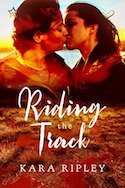
Riding the Track by Kara Ripley (NineStar Press: contemporary f/f):
I loved this book — until I loathed this book.
There are a few things you don’t do in romance. You do not kill the dog. You do not have one character cheat on the other (whether polyamory or scene play counts as cheating is a constant debate topic). And you do not, you absolutely do not have the story end with the characters not together. Whether they’re just trying it out (Happy For Now) or in it to win it (Happily Ever After), you have to end the book with your h/h (or h/h/h+, for you ménage readers) as a joined unit.
This book puts on riding boots and stomps that rule into the muck. I have rarely been so angry and disappointed to hit the end of a story. I read it three times to make sure, but it’s crystal clear: our narrator-heroine goes back to the States, and the hot Australian lesbian cowgirl stays in the Outback.
It didn’t have to be like this.
Reader, I did my due diligence: this is a book I found in the Romance category on NetGalley, from a familiar romance publisher. It has a clinch cover, for the love of Garwood. The writing is superb: snarky, informal, self-deprecating, and keenly observed. Took the author less than two pages to win me over completely. Even learning that the book was a short novella rather than a full-length novel didn’t bother me. Life moves pretty fast; novellas are a great way to get in a full story without a lot of time investment. No length complaints here, if the story feels fleshed-out.
This one did. Until the very last page. Our heroines — cynical heartbroken American Clara, and earnest Australian cowgirl Evie — are finally hooking up, after three days of riding and flirting along the Oodnadatta Track. The descriptions of the landscape, the sharp banter, our narrator’s internal self-scolding, the mischievous heifer she names Little Mo-Mo…it was all so good. I had a set of blissful notes all typed up ready for review. All I was waiting for was the hint of hope for the future, that little chime to let me know I could let go of all the tension I’d accumulated as a reader. The book wound me up, and wound me up, and wound me up — and then it split the heroines up because the vacation was over.
The most unsatisfying part of reading ebooks is not the fact that they don’t smell like paper and ink: it’s the fact that you can’t hurl them across the room when they’ve betrayed you.
This book is a bait-and-switch, plain and simple. The reason I’m putting this book in this column, even though it is clearly not a romance by the only definition that matters, is because I don’t want anyone else to get burned the way I have been.
Tell your friends. Spread the word. Save them from betrayal.
The land kept going, a great sleeping serpent of ochre rock, sand, and dust.
This Month’s Vampire Romance But Not Like That
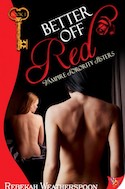
Better off Red by Rebekah Weatherspoon (Bold Strokes Bookes: paranormal f/f):
Before there was Dracula, there was Carmilla, a lesbian vampire serial. Later lesbian vampires became a whole Thing in horror cinema and pulp fiction, where the sinful, evil temptations of queer sex and female power mingled to terrify and titillate audiences assumed to be universally straight and male. Weatherspoon’s Vampire Sorority Sisters series (does what it says on the tin!) is definitely having fun with this tradition: the vampire heroine is named Camila, there’s a lot of juicy group sex just for the lush, smutty fun of it, and the plot touches on themes of power, control, violence, and living a life in the shadows. But this series is definitely pitched at queer women, by a queer woman, and it shows; the conflict comes from strong personal relationships rather than predatory hunter-and-hunted patterns, consent is actively debated, and the third book in the series recently won the Lambda for LGBTQ Erotica. It’s more Gothic than gory, and if you’re looking for something that puts a modern twist on that classic governess-in-peril mood, this is a great place to start.
Were amazingly good looks reason enough to trust your blood lusting captor?
Thursday Comics Hangover: Truth, justice, and popping pimples
Supergirl is a great character at her base, but she's been through so many permutations that it's hard for new fans to figure out where to begin with her. In the 1990s, she was a shape-changing interdimensional life form who had an affair with Lex Luthor. In the early 2000s, she was a sexualized fanboy's wet dream. In the 1980s, she was a perky aerobics instructor type who sacrificed herself to save the universe.
You can find a few stories from every period of Supergirl's long career that might appeal to wider audiences, but what about her origin? What about Supergirl is unique? What book explains her place in the universe without using her relationship to Superman as the primary measurement?
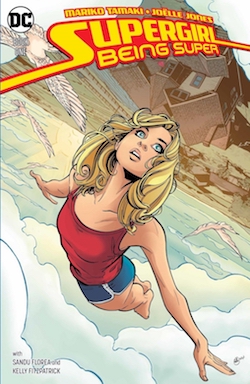
That's where Supergirl: Being Super, a new paperback collection written by Mark Tamaki and illustrated by Joëlle Jones, comes in. Being Super is an origin comic that reimagines Supergirl's story in the framework of a contemporary young adult novel, complete with pimples, high school friendships, and a confident main character who struggles to find her place in the world.
Jones is one of the most gifted superhero artists at work today. Her Supergirl is dynamic and distinctive, a tall and occasionally gawky young woman who carries all her worries and her joys plainly on her face. She looks and carries herself like a high school student, unlike most of the recent incarnations of the character.
Tamaki fills in details to Supergirl's origin that other writers never bothered to consider. Her adopted father is gruff and more than a little controlling, but sweet deep down, like a cross between Ron Swanson and Pa Kent. Her friends are the kinds of good people that a superhero would want in her life: thoughtful and kind and inspirational. Poignant moments, like a kid sister reading a goodbye letter during a high school student's funeral, are moving without being maudlin. It's a fully-developed world, and the plot examines Supergirl as a decent character without making her unbelievable. (This is the best way to handle Super character, as I've written.)
That said, Being Super does fall into a few of the traps that have befallen Superman comics over the last few years. There's way too much time spent on Kryptonian culture and history, for one thing. Nobody cares about Krypton; Krypton is useful only as the reason for Superman and Supergirl's powers, and the less you dwell on it the better. And the plot is stretched a little too thin in the first two thirds of the book and jumbled up a little too thick in the last third.
But this is the best origin that Supergirl has ever gotten, and I hope Tamaki and Jones get to revisit this world sometime soon. Readers deserve a solid run on the character to consider as canon, and Being Super makes for a great start.
Loaded words
At the beginning of last night's edition of the Reading Through It Book Club, I was pretty high on Roxanne Dunbar-Ortiz's Loaded: A Disarming History of the Second Amendment. The way that Dunbar-Ortiz framed America's love affair with guns as an extension of the nation's history of colonialism and racism made a lot of sense to me.
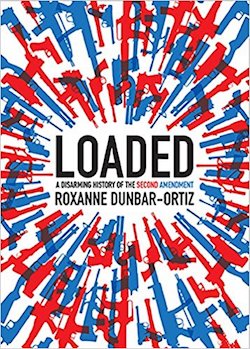
Others in the book club were not as high on the book as I was. One member said Loaded had too many typos and unsubstantiated claims to take seriously. Another refuted a few of the book's historical facts, and argued that a few historical interpretations — particularly behind the motivation of the Virginia Tech shooting — were borderline irresponsible. Many others landed somewhere in the middle. "I didn't not like it," someone said.
But even those who disagreed with Dunbar-Ortiz's methodology agreed with many of her conclusions. Gun culture in the US simply is different than everywhere else, and it's really remarkable how many of the institutions we simply assumed always existed are fairly new inventions. (The concept of a police force, for instance, is much newer than most people think.)
So with that common ground found, how do you dismantle a culture that is hard-wired into America's original sins? Despite Dunbar-Ortiz's worthy efforts to get to the bottom of the word "militia," you can't get anywhere by nitpicking the Second Amendment in hope of finding some wisdom in the words of the Founding Fathers. Nobody will ever win a fight by getting to the true meaning of the Bill of Rights.
Instead, it's better to find common ground, and to rework your messaging until it appeals to a majority of people. Stop referring to "gun control," for instance, and start talking about "gun safety" or "gun responsibility" or "ending gun violence." Talk about the public health costs that guns exact on America, the way that we now talk about the health risk of cigarettes, or the risks of impaired driving. Make the conversation about sensibility and security, rather than morality and shame.
It feels hopeless every time some white man with an abusive past and a history of racist behavior picks up a weapon of war and exacts his will on the world. But if you look around, you'll see that progress is being made. This fall, people who live in Washington state will be able to vote for Initiative 1639, which creates safer schools and communities. (If you're looking for something to do in the battle against gun violence, please consider donating money or, more importantly, your time to passing this important initiative.) We're having different conversations now than we were ten years ago. Things are getting better.
The trick is always refining the conversation, being more accurate with your words, and being clear about what you want and what you see in the world around you. Even book club members who were skeptical about Loaded admit that they might have liked the book better if it were labeled "A Polemical History." The work that words do is invisible most of the time, but this is the work that defines our world, and everything in it.
The next Reading Through It Book Club meets at Third Place Books Seward Park at 7 pm on Thursday, July 5th. We'll be discussing David Grann's Killers of the Flower Moon: The Osage Murders and the Birth of the FBI.
Get a discount for poetry-themed SIFF films this week!
This week, the Seattle International Film Festival is showing two poetry-centric films that you should know about. And if you buy in advance online using the code POETRY18, you'll get three dollars off your ticket! Here's more about the movies:
Wild Nights With EmilyActors Amy Seimetz and Kevin Seal scheduled to attend
Wild Nights — Wild Nights! / Were I with thee / Wild Nights should be / Our luxury!
If you read this poem by Emily Dickinson (Molly Shannon) according to the conventional view of her—celibate, prim, reclusive—rather than as an overt expression of physical passion drawn from first-hand experience, you'll change your mind after seeing Madeleine Olnek's puckish yet poignant biopic, which convincingly posits Dickinson's sister-in-law Susan (Susan Ziegler) as waaay more than a friend and muse.
Thursday, June 7 · 7:00pm · Egyptian
Saturday, June 9 · 4:00pm· Egyptian
My Name is MyeishaActor Rhaechyl Walker scheduled to attend
Based on the internationally renowned play "Dreamscape" by Rickerby Hinds—itself a fictionalized retelling of the police shooting of Tyisha Miller—My Name is Myeisha uses hip-hop, spoken word poetry, and dance to dig into the life of a single African-American teenager "born and raised in the IE;" as the medical examiner beatboxes his way through describing each of the 12 bullets that entered her body, Myeisha launches into soliloquies about black hair culture, her high school sports career, and when she lost her virginity.
Friday, June 8 · 9:30pm · SIFF Cinema Uptown
Saturday, June 9 · 1:45pm · Pacific Place
Molly Shannon is one of the greatest comedic actors of our time, and casting her as Emily Dickinson is absolute genius. And here's a short promo film for My Name is Myeisha that screened at Sundance:
It's been kind of a rotten season for blockbusters, so treat yourself to an actually good movie this weekend!
Book News Roundup: Don't stand by your man
Seattle-area lit mag Word Lit Zine editor-in-chief Jekeva Phillips had this to say about her relationship with Junot Diaz, who has been accused of sexual assault: "As fans we fall in love with the work—a book, tv show, character, an album— and because we feel so close to that work we transfer those feelings to its creator. When that creator fucks up, he/she takes away that joy for the fans."
Yesterday, the Boston Review, which employs Diaz as a fiction editor, decided to stand by their man:
Our decision @BostonReview about our fiction editor, Junot Diaz:https://t.co/HWJapOWOje pic.twitter.com/mITkEtxLDr
— Joshua Cohen (@jcohen570) June 5, 2018
- Well, that's certainly a choice. But I prefer the choice of Boston Review's poetry editors, who all quit when Boston Review announced they were keeping Diaz on staff:
— Lynn Melnick (@LynnMelnick) June 6, 2018
We support the New Yorker staff union. If you agree, and if you subscribe to the New Yorker, you should definitely send a little card or email to let the magazine know about your support of the union. Magazines simply can't afford to take their subscribers' wishes lightly these days.
Amazon-owned Comixology, which was previously a storefront for e-comics, recently announced they were going to publish their own original comics, thereby competing with traditional comics companies. The Beat looks into what this means for the comics industry.. And Fantagraphics Associate Publisher Eric Reynolds published a Twitter thread this week talking about his concerns.
If I had any advice for comics shops and comics publishers, it'd be this: don't ever trust Amazon. Don't let your guard down for a second. They will get as close to you as possible and they will stab you right in between the ribs. Expect them to try to fuck you over in brilliant and inventive ways. That's literally their business model. If you believe I'm being hyperbolic, I urge you to look at their entire history to date.
That said, the Amazon-produced 11-episode adaptation of Colson Whitehead's Underground Railroad is going to be entirely directed by Moonlight's Barry Jenkins and it's probably going to be amazing.
Congratulations to the winners of this year's Lambda Literary Awards, including Roxane Gay and Emil Ferris!
This hedge fund is trying to break into literature by "tak[ing] what we know about hedge fund management and apply[ing] it to literature and the creation of a new generation of best-selling novelists." Gross!
Talking with Cat Rambo about what happens if America continues down the path of Trump
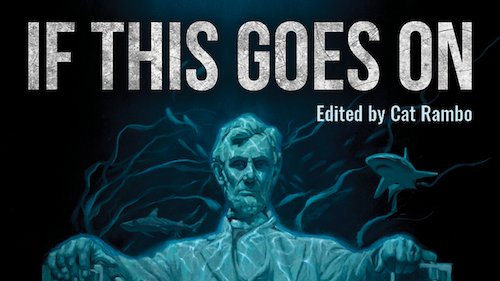
Cat Rambo is a mainstay of Seattle science fiction scene: she attends readings, she supports the community through teaching, and she represents the city as an acclaimed novelist and short story author.
Last week, Rambo announced a new project through Kickstarter: If This Goes On, an anthology that examines what might happen a generation or so into the future if the current political climate continues as it has been. Most everyone reading this has read a headline about the Trump administration over the last year and a half and wondered to themselves, “are we going to be okay?” If This Goes On attempts to answer that question.
Rambo has collected stories from 30 new and established sci-fi authors, including Seattle author (and Seattle Review of Books contributor) Nisi Shawl. Backers will help fund the publication of the book, and they will receive copies before If This Goes On is available in stores. At the time of this writing, the Kickstarter is more than halfway to its goal; if you’d like to contribute and get an e-book, paperback, or special hardback edition of the book, you can just click these words. Rambo emailed with me late last week about the project, the pains and pleasures of editing, and all the other projects she’s currently working on.
How did this project come together? Was it your idea, or were you brought on later?
This project was the result of talking with publisher Colin Coyle of Parvus Press, who I had met through mutual volunteer work with the Science Fiction & Fantasy Writers of America (SFWA) in the weeks after the 2016 elections. We both felt that what we saw happening in America — the normalizing of hatred, the jettisoning of truth, and the corruption of so many basic values — was something that writers had to address. That in an era where questions of responsibility, humanity, and basic ethics are being raised on a daily - sometimes it seems like hourly - basis, we agreed that writers had to speak out, using the genre most adapted to predicting the future, speculative fiction.
We did a mix of half solicited stories and half open call, because it’s important to me that projects like this be open to newer writers. As a result we got some dynamite pieces from both established writers and some names that I think will be coming up over and over again in years to come. Some of the futures explored in the book are purely metaphorical, while others seem entirely too possible. I was pleased with the range of stories turned in, and the fact that there were so many hopeful ones.
These are some very impressive authors — as an editor, is it more difficult to edit people you admire? And every editor/writer relationship is different—it seems like it would be incredibly difficult to edit 30 different contributors, because you’d have to learn 30 different ways to edit a text. Would you say that’s true, or am I just a bad editor?
Yes! One does not want to offend -- or worse yet, misunderstand -- the writing of someone whose work you love. But to me the job of an editor is to make the story more so, to figure out how, in the words of the immortal Spinal Tap, one turns the good parts up to 11 while smoothing any roughnesses. I’ve just finished up those edits, and it’s impressed me again with what a solid book this is.
Is there anything you’d say to someone who loves these authors and wants to support the book but is feeling incredibly burnt out about current events?
Well, for one, I’m right there with everyone else in feeling a little burned out by the onslaught. But, as I said, there’s some messages of hope there, expressions of the innate goodness many of us (myself included) believe human beings are capable of. Moreover, the book has a sense of community, of knowing others are there with you in going ‘woah, wait a minute, things have gone beyond the pale.’
And if you don’t want to read it, buy it as a gift for a friend! The Kickstarter’s got some nifty levels to it if you want to show solidarity with the project.
For me as a reader, it was hard, even impossible, to read fiction the year after Trump became president. Some of it had to do, I think, that I was dealing with novels that were written before the supposedly unthinkable happened, so they felt weirdly out-of-date, even if they were brand new. As a writer, did you have to rethink the way you approached fiction?
I think I had a few months where I could not write near future SF at all. On a purely practical level, some sections of the possible future got closed off, and events skewed so wackily that I, along with other people, kept waking up with the sense we’d wandered into a badly written TV show that was refusing to end. I worked on my fantasy novel, Hearts of Tabat, the one that just came out, in part because it’s an attempt to talk about how oppression works.
Teaching, strangely enough, was also comforting because it reinforced and built my awareness of some of the fierce young activists getting stirred up by events.
You’re typically what I’d describe as a prolific author, but this year seems especially big for you—you only just had a launch party for the second book in your Tabat Quartet. Are you working harder than ever, or have publication dates just aligned like some remarkable multi-planet eclipse? Do you have any more publications on the horizon?
I think that’s partially a result of the way publishing works and the fact that I’m a hybrid author doing both traditional and indie publishing. Hearts of Tabat is out through Wordfire Press, run by Kevin J. Anderson (who actually edited the book) while I’ve got a nonfiction book about writing, Moving From Idea to Draft, that just came out this week, and am re-issuing two collections this year. Right now I’m working on Exiles of Tabat, the third fantasy novel, with my target of a first draft by summer’s end in sight and a release date of next May, barring disaster and/or the release of a videogame with as much allure as Skyrim held for me.
At the same time - yeah, I’m reasonably prolific, striving a la Stephen King for 2,000 words a day, mainly because I’m pragmatic and know that if I’m not writing, stuff’s not getting published. I’m lucky enough not to have a day job but the boss I’ve ended up working for is tougher than any other employer I’ve ever had. Still, I’m blessed in that I can take on some projects like this one, which is very much a work of passion and love.
Short Run announces special guests, opens exhibitor applications
While you were grillin' burritos or sockin' the beach or whatever the hell it is people do over Memorial Day weekend, the Short Run Comix and Arts Festival was busy making some big announcements about this year's festival, which happens on November 3rd this year at Seattle Center.
First! They dropped this year's poster, which was drawn by Anna Haifisch. It's a beauty:

Second! They announced some very special guests who'll be attending this year's festival. Haifisch is obviously attending, along with Rina Ayuyang, Mimi Pond, Olivier Schrauwen, Whit Taylor, Carol Tyler, and November Garcia.
I don't have much personal experience with most of these authors, but Pond's semiautobiographical account of waitressing, The Customer Is Always Wrong, is one of the best comics I've ever read about the experience of working. Garcia is the 2018 Short Run Dash Grant recipient. (The Dash Grant is a great scholarship program that funds the publication of a comic and sponsors an emerging artist at the festival.)
And lastly, if you want to have a table at this year's Short Run, they are now accepting applications for exhibitors. The deadline is July 31st but for God's sake don't wait until the last minute or you'll psych yourself out, okay? Apply now.
UPDATE: And Short Run just today debuted a nifty, slick video explaining the festival to a whole new audience:
Our new video! https://t.co/gz6Y06xN3g
— Short Run (@shortrunseattle) June 5, 2018
How not to read a memoir
Published June 05, 2018, at 11:56am
In which Paul Constant does a terrible job of reading Seattle author Neal Thompson's memoir Kickflip Boys.
即溶愛情咖啡 (Instant Love and Coffee)
Translated from the Chinese by Eleanor Goodman
最近愛上即溶咖啡
溶掉你 像溶掉我心
留下污漬
在牆壁、衣角和抽屜
發霉 沒有發臭
許是咖啡因已經過期
連閨怨也無法保鮮是因為神探伽俐略才愛上咖啡
心跳、手震
與愛情的凶案無關
(誰是無辜的殺害者?)
跌宕、懸疑
和你的行蹤脫線
(你的不在場證明!)
偶爾會在網上發現
跟你同名同姓的人
但網海恢恢 疏而缺漏
我的死前留言如被肢解的屍身
總載浮載沉
祗好離座離線走長長的階梯
從前半生走到下半世最後落腳空曠的天井抱著貓看天
清晨的陽光濕著昨夜的雨
鳥聲啞著城市的煙塵
貓的尾巴很短 比我的愛念長
倏忽鬆手便從此滑落
貓毛與虛無我低頭對自己的影子發笑
舉頭尋找一片青天
祗得來一張藍幕的暈眩
像電腦的閃光
然後樓下傳來兇狠的狗吠
尖銳的嘶叫咬住我的聽覺不放
狼心 如鐵
我追著黑貓咒罵
胃裏一陣翻騰
決定再來一杯咖啡
溶掉你 像溶掉我心Translation
Recently I’ve fallen in love with instant coffee
dissolving you like dissolving my heart
leaving dark stains
on the walls, clothing, drawers
mildewing odorless
perhaps the caffeine has expired
not even love poetry can keep things freshI fell in love with coffee because of Detective Galileo
my heart leaps and hands tremble
but that has nothing to do with love’s homicide case
(who murdered the innocent?)
boldness, suspense
and your whereabouts offline
(your alibi!)
once in a while on the web I’ll discover
someone else with your name
but the internet is vast scattered and uneven
my last note before I die will be like a dismembered corpse
bobbing up and down
it’s better to go offline and climb a long flight of stairs
from the first half of your life to the secondAt last I’m on the open patio with the cat watching the sky
the early morning sunlight is wet from last night’s rain
the birdsong is hoarse from the city’s pollution
the cat’s tail is quite short it’s longer than my affection
I let go swiftly and off slips
cat fur and nothingnessI bow to my own shadow and smile
I lift my head to look for a bit of clear sky
but all I see is a dizzying blue curtain
like the flickering of a computer screen
then a ferocious barking drifts up from a lower floor
the sharp yapping sinks its teeth into my senses
a wolf heart like iron
I chase the black cat cursing
my stomach churns
I decide to have another cup of coffee
dissolving you like dissolving my heart

